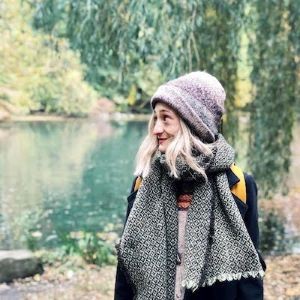The Playwright's Room: Ellis Stump

The Playwright’s Room is a series featuring the newest cohort of Columbia Playwriting students. These playwrights study under the tutelage of David Henry Hwang and Lynn Nottage.
This week, we sat down with student Ellis Stump. Stump is a youth theatre educator and traveling playwright. Her recent residencies include Wallace Stegner House Canada and the Prague Performing Arts Academy. Stump’s works explore catharsis and growth of ourselves, our relationships, and the evolving world, through experimental absurdism, Jewish existentialism, optimistic imagination, and intersectionality. She organizes, directs, designs, and performs interactive stories, weaving in research and live collaboration.
Tell me about your first time in Theatre.
Ellis Stump: Theatre’s been a part of my life for a long time. I remember in first grade I wrote scripts, distributed them to my friends, and then made them perform them on the playground. When I went to college I wanted to study theatre but couldn’t justify it, so I got five degrees, none of which were theatre: film studies, international studies, English, gender studies,and clinical psychology. I explored clinical psychology for a while and learned that therapists are essentially playwrights. In that field, I spent a lot of time listening. All of my degrees and careers inform what I write. Everything I write is responsive and interactive with others.
What kind of artwork and experiences influence your work?
ES: I love Brechtian didactic work. I love that in life we’re all spectators and spectacles, especially nowadays with social media. Everyone is a multidisciplinary crafter. I’m also obsessed with laughing absurdly in the darkest moments. I love the idea of sliding along the age spectrum, speaking to our inner teens and inner adults. In the moment, immediate human presence is significant to me. I love clashing forces: tragic and comedic, public and private. I’m a huge believer of going off on tangents. Every single time a word is spoken, it’s to a different space. I also love to travel. I spent a full semester in India, Germany, and the Czech Republic during my studies.
I’d love to hear about your play, The Last Coffee Shop In The City.
ES: The Last Coffee Shop In The City was written kind of in verse. I had just gone through my first break up. There are experiences we go through that are looked at as juvenile, but I think a first breakup is significant. I imagined characters around that, who are all going through the stages of grief for different things in their lives. I love the concept of connection and how we all cross paths. I am definitely returning to this play because it’s so timely, being about intimacy, distance, and everything we have to release and heal from. I might play with it this semester. I want to remain true to all of that authenticity from when I first wrote it, combined with the structure I’ve learned at Columbia.
Why did you pick Columbia for your MFA?
ES: We’ve all found ourselves in unique situations lately. When this all began, I was in rural Saskatchewan, in residency as a writer and devising kids musicals. I was like an urban alien to these kids. I found myself on the last plane over the border back to the United States, before shutdowns began. I had already been experimenting in digital and virtual realms. All of a sudden no one has the answers and I wanted to be on the front line. Columbia seemed like the most inquisitive education that fit my artistic style. Since I didn’t study theatre, I never got to be in a room of playwrights, reading cliché old plays. One great benefit is that my professors respect that we need jobs and need to work. David Henry Hwang and I connected really well in my interview. We talked a lot about our signs. He’s a Leo and I’m a Gemini
What’s a lesson you’ve learned from your time at Columbia so far?
ES: Robert O’Hara ’96 taught Practicum this semester. I’ve always been a more private writer and this class taught me to trust impulse and go with my gut. We always had to submit a play on Monday morning, and I’d email him at 4:00am saying “This is bad” and he’d say “I don’t care, send it in.”
How would you define your writing style?
ES: Earnest, human, dramedies about love and purpose. It’s a lot of crafting and collaging. Child-like imaginative. I like so many things..stay tuned.
What’s your favorite play/musical?
ES: If we’re going classic, I love Twelfth Night and Shakespeare comedies. They’re always relevant. I think about Who’s Afraid of Virginia Woolf a lot. I love Christopher Durang. I love Greta Gerwig and Gigi Cohen, maybe they can read this and we’ll be friends.
I love Greta Gerwig, I just saw Lady Bird for the first time and loved it.
ES: You must watch her whole canon. I love how she always feels like an Indie Queen. She recently said in an interview that she stands strongly by her unpolished old plays. She said she still loves the pieces that she wrote for class and submitted to schools when she was young. I think that’s so powerful. Some things can be a rough draft.
What’s next for you?
ES: I have two plays coming up this semester. They were pieces that I was reached out to about, which is new for me because I normally submit my plays or reach out to others.These plays are about culture and movement and travel. One is an absurdist Czech satire and the other is my raw poetry. I used to be very possessive of my concepts and for both of these shows, I’m not involved in the process, which is really neat. I’ve been very fortunate and this gave me a lot of confidence.